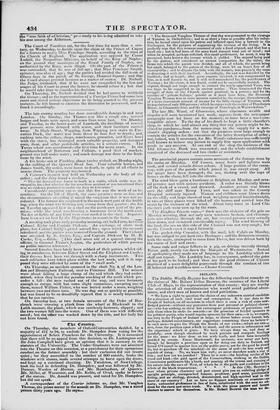Ebt Country.
On Thursday, the members of OxfordConvocation decided, by a majority of 474 to 94, to exclude Dr. Hampden from voting for the appointment of Select Preachers for the University. It is rumoured that there will be an appeal from this decision, as Dr. Lushington and Sir John Campbell have given an opinion that it is contrary to the statutes of the University. The Under-Graduates were not admitted into the Theatre on this occasion, as a punishment for their uproarious conduct on the former assembly : but their exclusion did not insure quiet ; for they assembled to the number of 800 outside, broke the windows with stones, made several attempts to burst open the doors, and kept up a continual shouting. Dr. Twisleton, of New College, took the lead in defending Dr. Hampden; and was followed by Mr. Duncan, Warden of Merton, and Mr. Rowlandson, of Queen's. Mr. Miller, of Worcester, and Mr. Keble, of Oriel, spoke in favour of the statute. Dr. Arnold was present, and voted for Dr. Hampden, but did not speak.
A correspondent of the Courier informs us, that Mr. Vaughan Thomas, the prime mover in the assault on Dr. Hampden, was a noted person thirty years ago. He says- " The Reverend Vaughan Thomas of that day was presented to the vicarage of Yarnton in Oxfordshire ; and in as short a time as possible after his Mac. than, he turned round upon his patron and inflicted upon him a lawsuit in the Exchequer, for the purpose of augmenting the revenue of the living. It is perfectly true that this revenue consisted of only a fixed stipend, and that but a small one ; but it had been of the same fixed amount time out of mind ; and when he accepted, perhaps solicited, this small preferment, he must, it may be presumed, have known the income which it yielded. The stipend being paid by the patron, and considered an ancient composition for the tithes, the farms into which the parish was divided, and all of which, the parish being but small, belonged to the patron of the living, were let on leases free of all vicarial tithe ; and to dispute the tithe with the tenants, was precisely, the same as disputing it with their landlord. Accordingly, the suit was defended by the landlord ; and at length, after great expense incurred, it was compromised by him, as is well known to, and Is still well remembered by, the parishioners of Yarnton ; for the claim, it was found, could not be successfully lesisted. The stipend, though not large enough to content the newly-appointed Vicar, was too large to be supported as an ancient modus. Thus terminated the then struggle of duty to the Church against gratitude to a patron ; and for the sacrifice of private feelings,' painful as it must have been, the Reverend Vaughan Thomas was in sonic measure consoled by the receipt, thenceforward, of a more convenient amount of income for the little vicarge of Yarnton, with its population of only 299 persons ; which he enjoys with the rectory of Du nsbourn House, in Gloucestershire, and the vicarage of Stoneleigh, in Warwickshire."
The late Mr. Wood, of Gloucester, whose enortnous wealth and singular will were mentioned last week, appears from the newspaper paragraphs now let loose on his memory, to have been a most con- temptible miser. To the day of his death he kept a little chandler's shop, in which he sold almost any thing that any person might be in- clined to purchase—from the mouse-trap to the supply for a mer- chant's shipping orders : not that the premises were large enough to contain the articles for the execution of the letter description of order ; nor, indeed, was it necessary, for Mr. Wood's substance was sufficiently well known to induce any person to supply him upon application with goods to any amount. At one end of the shop the business of the Old Gloucester Bank was transacted ; and the whole establishment consisted of the deceased and two clerks or assistants.


























 Previous page
Previous page